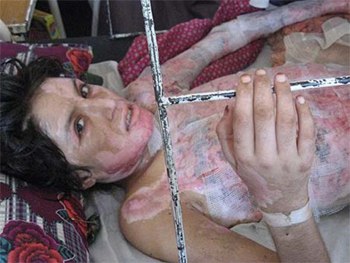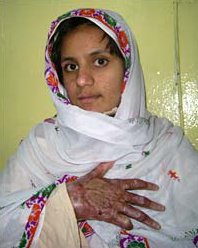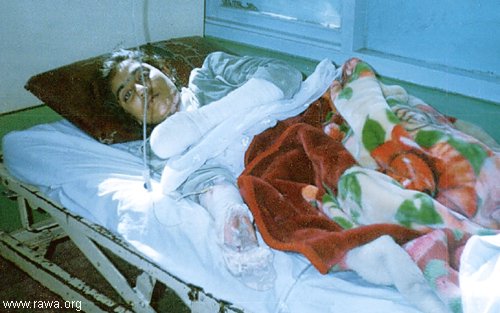Umer Farooq
Decades of civil and social upheaval has intensified traditional social pressures on Afghan women who were already suffering at the hands of poverty and decadent social traditions. All this was coupled by the economic dislocation of a large section of Afghanistan society. In such a situation, Afghan women found an easy escape in suicides. The trend of suicide, which started in the early years of this decade, is now practiced by desperate Afghan women throughout most parts of Afghanistan.
Apparently, the removal of the Taliban has brought about a positive change in Afghan society and the new government of President Hamid Karzai has enacted certain laws to improve the social condition of women in Afghanistan. However, this has only a marginal affect on the growing trend in Afghan society of women committing suicide.
RAWA Video Clip of self-immolations in Afghanistan
According to the latest survey conducted by the United Nations Development Fund for Women (UNIFEM) in Afghanistan, 65 percent of the 50,000 war widows living in Kabul see suicide as the only option to escape their misery and desolation.
These widows were interviewed by UNIFEM in 2004. It took UNIFEM and associated nongovernmental organizations (NGOs) one year to complete the survey. More than half these war widows said that they were practically considering committing suicide to escape the miseries they find themselves in.
The UNIFEM survey indicates that the majority of Afghan women are victims of mental and sexual violence, which compels them either towards committing suicide or drug addiction. UNIFEM prepared the reports based on this survey in cooperation with other Afghan nongovernmental organizations.
A representative of the Revolutionary Association of the Women of Afghanistan (RAWA) described the conditions of war widows, especially those living in Kabul, as terrible. She said widows living in Kabul have to look after their families where there is little opportunity to earn a livelihood but a high rate of inflation.
She said 16 women had already ended their lives since the interviews were conducted. Highlighting the social structure, she said family and gender discrimination and violence against women was common in most parts of Afghanistan.
However, women in other parts of Afghanistan are not far behind when it comes to committing suicide in the face of growing social problems.
According to Kabul-based human rights organizations, some 100 women during the last eight months have attempted suicide in Kandahar by committing self-immolation or taking poison.
In Helmand province, which is also known as the center of poppy cultivation, more than 100 women committed suicide, according to the figures provided by the Women's Affairs department of the government of Afghanistan.

Bora Gull Heha, 16 years old, lies in a hospital bed in Kandahar. When the abuse became intolerable, Heha took what she though was her only way out. She grabbed an oil lamp and set herself ablaze. (CP PHOTO/Stephanie Levitz)
In Herat province, where the practice has been most reported and publicized, there were 93 cases of attempted suicide last year and 54 so far this year. According to figures released by the department, more than 70 percent of these women die.
According to the Women's Affairs department, domestic disputes and economic problems are behind the increasing incidents of women committing suicide in Afghanistan.
The director of the Women's Affairs department, Dr. Fouzia, said the factors that contribute to increasing the trend of suicide among Afghan women are family disputes, dilapidated economic conditions and daughters tying the knot against their consent.
One such case was reported by Afghanistan's media in recent months. Seventeen-year-old Ghoty (Blossom) committed suicide early this year. Her family did their utmost to hide the real cause of her death. But her dejected brother told Afghanistan's newspapers that she committed suicide after she was forced into a marriage by her father.
A doctor who treated Ghoty said, "We received Ghoty when she was expired, and after postmortem we found excessive use of opium caused her death."
However, the preferred way of committing suicide for Afghan women is self-immolation. According to a recent report by the Afghan Independent Human Rights Commission, self-immolation is the common way of committing suicide among Afghan women.
"Our data show that at least 64 women have attempted suicide by setting fire to themselves and 36 others have resorted to taking poisons such as rat killers during the past eight months," read the report of the human rights organization.
Another report by the Revolutionary Association of the Women of Afghanistan said, "Desperate to escape domestic violence, forced marriage and hardship, scores of women across Afghanistan each year are committing suicide by fire."
That association said the situation had become much better since the fall of the Taliban six years ago but that life remains miserable for many Afghan women in the Afghan countryside and suicide is a common escape.

Gulsoom is 17-years-old and married. Last year she tried to commit suicide - she failed. She set fire to herself but, against the odds, survived with appalling injuries. (BBC News, Dec.7, 2006)
One report suggests that 70 percent of the women who attempt suicide die. However, some survive to tell their tale. Another such case reported by Afghan media is the story of 17-year-old Gulsoom.
Gulsoom was compelled toward suicide after years of maltreatment at the hands of her husband, who was a drug addict. She was forced to marry a 40-year-old man when she was only 17. "For two years, my husband beat me and treated me like an animal," Gulsoom said.
Another much-publicized story is that of 20-year-old Jamila, who tried to commit suicide by fire last year. "I did not know how to end the misery of torture and daily beatings I got from my cruel husband. So I poured petrol on myself and set myself ablaze," said Jamila. She is receiving treatment for her injuries in a hospital in Kabul.
With burn marks still clearly visible on her thin neck and face, Jamila said she had divorced the man after spending only four months with him and was now living with her father. "I did not like him even at the beginning … but there was no solution because I was married by my father," Jamila said.
Womenkind -- an international NGO -- released a report on Afghan women last year that throws light on the factors that contribute to the increase of suicides among Afghan women.
The report said that 80 percent of marriages in Afghanistan are forced and that more than half of Afghan women are married before they turn 16 to men who are much older. The exchange of women and girls to resolve a crime, debt or household dispute is also common and in most of such marriages violence against women is a common practice.
The Karzai government recently banned the marriage of women under 18 years old. Other laws are in the pipeline to improve the social conditions of women in Afghanistan.
However, not all the suicides result from domestic violence. There are cases where sexual violence has led women toward suicide, as the case of a female election worker, Muska, in Nangrahar province in Southern Afghanistan clearly demonstrates.

Muska in the hospital in Jalalabad a few days before her tragic death on Oct.18, 2004.
Muska, who was traveling with her team to different villages registering voters during the 2004 presidential elections, was raped by the driver of the official vehicle. On the way back to his hometown at the end of the day, when Muska was alone with him, the driver stopped the car, produced a knife, threatened Muska and attempted to rape her. Muska resisted. Although injured, she was able to run away from the car and arrive at the house of her uncle. The next day, she went into the kitchen and covered herself in gasoline, then lit her body on fire. She succumbed to the injuries she received within a week.
Experts say that under the repressive Taliban regime women were deprived of education and voting rights. Today, there are women members of parliament but they are still considered second-class citizens in most parts of the country.
In such desperate social conditions the trend of suicide is rising in Afghan society, said an Afghan expert. Most of the cases, however, are never reported for religious reasons or because of the social stigma attached to the act of a woman taking her own life.
Afghan government officials admitted that reliable statistics on self-immolation and suicide nationwide are difficult to gauge. He said most of the cases are recorded by the international NGOs and not by departments within the Afghan government, adding "Most of those cases which are record take place in the big cities of Afghanistan whereas these incidents of suicide in the rural areas remain unrecorded."



